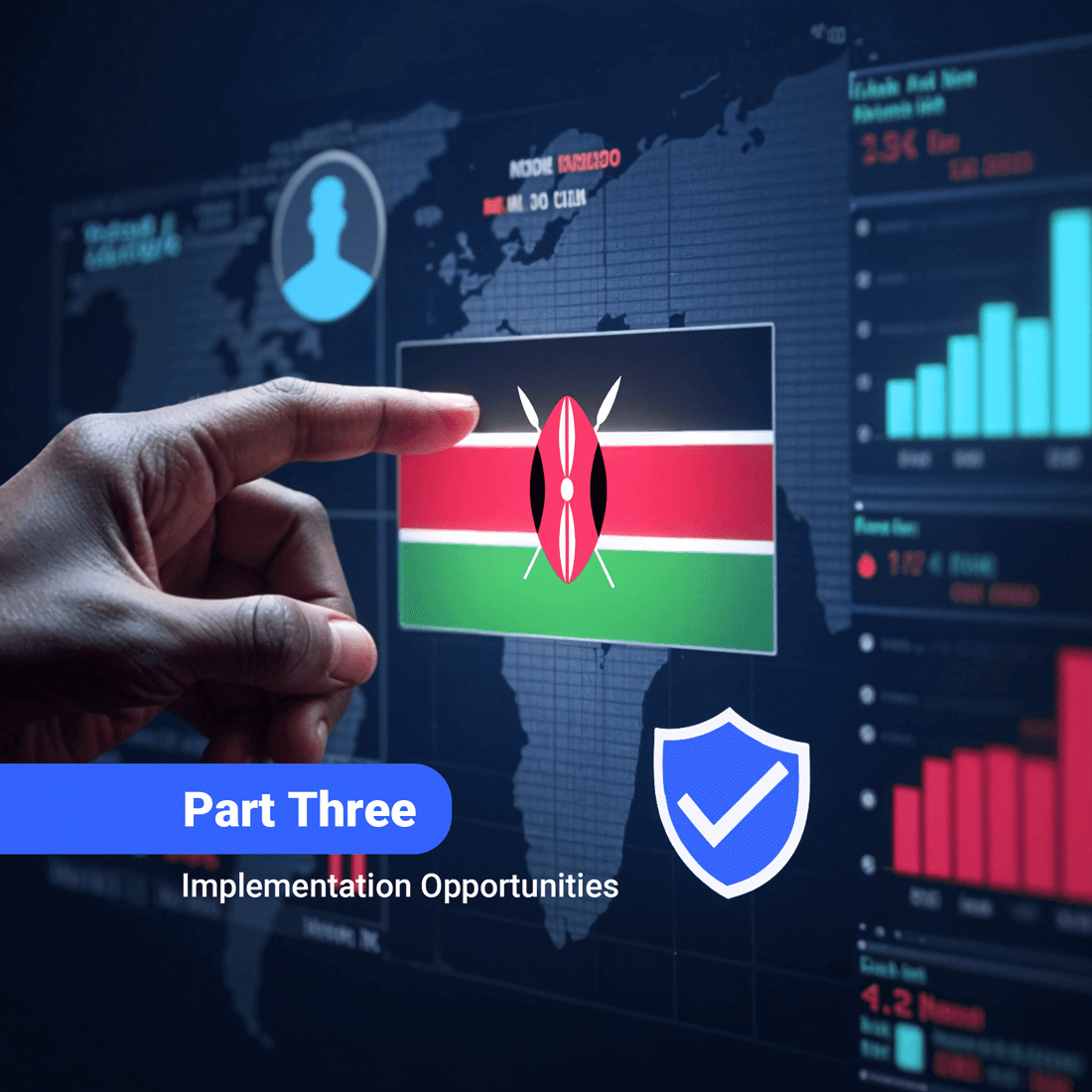Turning Strategy into Reality
Implementing anti-fraud tools and practices in Kenya is both a necessity and an opportunity for insurers. The Kenyan insurance ecosystem has been rapidly embracing digital transformation – from mobile-based insurance products to online claims reporting – which creates a ripe environment to embed fraud controls by design. Insurers can integrate identity verification APIs and document screening tools into their customer-facing apps and internal systems with relative ease. Many solutions are available off-the-shelf or via software-as-a-service, meaning even mid-sized insurers can adopt them without building everything from scratch. For example, an insurer could work with a fintech/insurtech vendor to enable national ID checks and selfie onboarding in their mobile app for policy purchase or claims filing, bringing bank-grade KYC processes into insurance. Liveness detection and document OCR can typically be added via a Software Development Kit (SDK) to existing mobile apps. The investment in such technology is justified by the reduction in fraud payouts and improvement in process efficiency over time.
From an operational standpoint, companies should prepare their teams and processes to make the most of these tools. This means training claims officers and underwriters on the new systems – for instance, how to interpret a fraud alert or how to handle a situation where the system flags an ID as suspicious. It’s also crucial to have a clear escalation path: when a rule-based system or ID check flags a claim, what next? Insurers should establish or strengthen Special Investigative Units (SIUs) or fraud investigation teams to dig into flagged cases. Kenyan insurers that lack a dedicated fraud unit could consider creating one or collectively supporting an industry-level investigative resource under the IRA or Association of Kenya Insurers. The good news is that Kenyan industry stakeholders are increasingly recognising fraud management as a specialised discipline. The Insurance Institute of East Africa, for instance, offers training programmes to equip insurance personnel with skills to identify and investigate fraud. This growing expertise will help in effectively using advanced tools – after all, technology is most powerful when guided by knowledgeable humans.
Regulatory support is another factor that can drive implementation. The IRA already mandates insurers to report fraud cases to the Insurance Fraud Investigation Unit (IFIU) and has signalled intolerance for fraud by treating it as outright crime. If the regulator encourages or provides guidelines on, say, electronic KYC in insurance or the use of data analytics in fraud detection, it will accelerate industry adoption. There are precedents globally – regulators in some markets have issued fraud control frameworks that require insurers to have fraud monitoring systems and to collaborate on data sharing. In Kenya, a coordinated push, perhaps as part of the upcoming regulatory changes or charters, could include provisions for insurers to maintain robust anti-fraud technology and to participate in shared databases like the motor insurance database. Given the economic cost of insurance fraud in Kenya, such regulatory nudges would be well-founded.
Regulatory support is another factor that can drive implementation. The IRA already mandates insurers to report fraud cases to the Insurance Fraud Investigation Unit (IFIU) and has signalled intolerance for fraud by treating it as outright crime.
Finally, it’s worth noting that implementing these anti-fraud measures aligns with other modernisation efforts. For example, verifying identities and screening transactions is also part of anti-money laundering (AML) compliance – something Kenyan financial institutions are expected to uphold. As insurers move toward risk-based pricing and personalised services, having clean, verified data free of fraudulent noise will improve analytics and product offerings as well. In essence, the same tools that prevent fraud can also streamline operations. Automated document processing speeds up claim handling for genuine customers, and digital identity verification can enable instant policy issuance, expanding business opportunities. Embracing fraud prevention technology is thus not just a defensive move, but a forward-looking strategy that can enhance the overall competitiveness and credibility of Kenyan insurers.

Operational Benefits of Proactive Fraud Prevention
Investing in fraud detection and prevention yields tangible benefits that go beyond just reducing losses. First and foremost is cost savings. Every fraudulent claim prevented is money retained. Over time, this can significantly improve an insurer’s loss ratio; claims paid vs. premiums collected. For example, after implementing advanced fraud analytics and cross-company data sharing, South African insurers estimated saving nearly $500 million in one year by weeding out fraudulent short-term insurance claims. Kenyan insurers stand to gain similarly; even modest reductions in fraud can translate to millions of shillings saved annually. These savings can eventually be passed to customers in the form of more stable or lower premiums, making insurance more affordable and attractive to the public.
After implementing advanced fraud analytics and cross-company data sharing, South African insurers estimated saving nearly $500 million in one year by weeding out fraudulent short-term insurance claims.
Another key benefit is faster and smoother claims processing for legitimate claims. When robust controls are in place, insurers can afford to fast-track low-risk claims with less fear of fraud, because the high-risk cases are being caught by the system. This risk-based triage means honest customers get paid quickly, improving customer satisfaction. It also frees up claim handlers from digging into every claim, allowing them to focus on complex or flagged cases that truly need investigation. Efficiency gains also come from automation – for instance, automating document checks reduces manual workload and error rates. In a competitive market, insurers that settle genuine claims faster and with less hassle will build a reputation for reliability, aiding customer retention and new sales.
Improved trust and brand reputation are softer but equally important benefits. A company known to have strong anti-fraud measures sends a message that it is prudent and protects its clients’ premium pool. It also signals to fraudsters that attempts will likely be caught, which can have a deterrence effect. Over time, as fraud cases decline, public perception of insurance may improve in Kenya. Consumers might no longer fear that “insurers always look for ways not to pay” – a common sentiment tied to the idea that many claims are disputed due to fraud concerns. Instead, with clearer processes and fewer fraud incidents, there will be fewer disputes and more success stories of prompt claims payment. This virtuous cycle can help raise insurance penetration – if people see insurance working as intended for peers, they are more inclined to buy policies for themselves.
Internally, robust fraud controls also contribute to a healthier corporate culture and risk management practice. When employees see that their company is serious about fighting fraud through investments in systems and support from top management, it fosters a culture of integrity. Staff are more likely to adhere to ethical standards and actively participate in fraud prevention – for example, reporting suspicious activity – if they know the company prioritises it. Additionally, an insurer that systematically fights fraud is better prepared for regulatory audits or compliance checks. It reduces legal liabilities and the risk of regulatory fines or sanctions that could arise from inadvertently paying out on fraudulent schemes which, in some cases, might be linked to larger criminal activities. In short, the operational health of the insurer improves – financial metrics get better, processes speed up, and stakeholders, including customers, regulators, and shareholders gain confidence.
Conclusion
Claims fraud in short-term insurance is a pressing issue in Kenya, but it is not insurmountable. As this discussion has shown, practical, non-ML-based tools and controls can make a significant difference in detecting and preventing fraud before it wreaks havoc. By deploying rule-based monitoring systems, insurers can catch suspicious claims early using well-crafted red-flag rules informed by local fraud patterns. By leveraging identity verification tech like liveness detection, they can shut down impersonation and identity theft attempts that fuel many scams. And by improving document fraud screening and reinforcing operational controls, they close off the loopholes that fraudsters have exploited in the past. These measures are well within reach for Kenyan insurers and have already proven their worth – from industry initiatives saving millions in motor claims to biometric checks blocking the vast majority of fake IDs.
The relevance to Kenya’s market cannot be overstated; fraud reduction will lower costs, enhance customer trust, and contribute to a more vibrant insurance sector where growth is not hampered by leakage. Insurers should view anti-fraud investments not just as a defensive expense, but as a strategic move that improves overall performance and customer experience. There is also strength in numbers – collaboration through data sharing with proper safeguards and collective efforts via the IRA and industry associations can tackle fraud networks that no single insurer can combat alone. In embracing these tools and strategies, Kenyan insurance companies will be protecting not only their own bottom line but also the insuring public at large. The message is clear; with a proactive, technology-enabled approach, the fight against short-term insurance fraud can be won, ensuring a fair and resilient market for all participants.
Fraud prevention is not merely about defending the bottom line; it’s a strategic investment that can improve operational efficiency, enhance customer trust, and support sustainable growth across Kenya’s insurance sector. If your organisation is ready to strengthen its fraud controls and build a more resilient future, we encourage you to reach out for a consultation or explore our comprehensive FRM product set. Together, we can help ensure a fairer, more secure insurance market for all.

